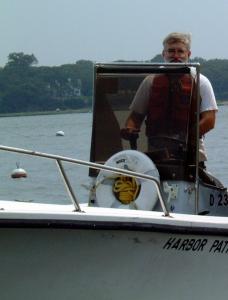Henry Lind

Cape Cod Shellfish Industry Interviews
This is a collection of 15 interviews conducted in 2007 with people on Cape Cod who are involved in the shellfishing industry. Five people who are employed by towns to manage and regulate shellfish (Shellfish Officers), seven people who own shellfish aquaculture businesses (Growers), and four people who harvest wild shellfish commercially (Commercial Harvesters) were asked the question “What does shellfishing mean to you?”. From that starting point, questions centered on how the individual got into shellfishing and then what they thought the future of shellfishing might be.
The interviews were conducted by Sandy Macfarlane, a retired shellfish biologist and conservation administrator for the town of Orleans. The work was done under a contract with the Barnstable County Cooperative Extension Marine Program. Each interview is summarized into a written document that varies from 807 to 1557 words long and has an accompanying photograph. The interviews represent geographic, age, gender, and experience diversity as well as shellfish species diversity. All interviewees are year round residents of Cape Cod. One theme that emerged from this work is that shellfishing remains an important component of the Cape Cod economy and culture and those who are involved are concerned about its continued presence.
In 2007, Henry Lind was the Director of the Natural Resources Department in the town of Eastham and a distinguished figure in the field of environmental conservation, with a particular focus on urban ecosystems. Born and raised in a bustling city environment, Lind's passion for nature was sparked by the green spaces that served as urban oases amidst the concrete landscape. His academic pursuits in environmental science led to a career dedicated to the development and management of urban parks and wildlife reserves. Lind's work has been instrumental in promoting biodiversity within city limits and advocating for sustainable urban planning. His efforts have not only enhanced the quality of life for city dwellers but have also provided critical habitats for urban wildlife.
Scope and Content Note
The oral history interview with Henry Lind offers an insightful exploration of the challenges and triumphs of urban conservation. He discusses how he began working for the town, the development of Cape Cod, the propagation of shellfish, the enforcement of regulations, aquaculture, and red tide. Lind recounts his early experiences that shaped his appreciation for nature within city environments and discusses his educational journey that paved the way for his career. He provides a detailed account of his initiatives to create and maintain urban green spaces, emphasizing the importance of these areas for both human well-being and wildlife preservation. Lind addresses the complexities of balancing urban development with ecological considerations and shares success stories of community engagement and policy influence that have led to the protection of urban natural areas. The interview also delves into Lind's vision for the future of urban conservation, highlighting the need for innovative approaches to integrate nature into the urban fabric. His narrative underscores the significance of environmental stewardship in the context of urban living and the ongoing efforts required to sustain and enhance urban ecosystems for generations to come.
Please Note: The oral histories in this collection are protected by copyright and have been created for educational, research and personal use as described by the Fair Use Doctrine in the U.S. Copyright law. Please reach out Voices@noaa.gov to let us know how these interviews are being used in your research, project, exhibit, etc. The Voices staff can help provide other useful resources related to your inquiry.
The NOAA mission is to understand and predict changes in climate, weather, oceans, and coasts, to share that knowledge and information with others, and to conserve and manage coastal and marine ecosystems and resources. The Voices Oral History Archives offers public access to a wide range of accounts, including historical materials that are products of their particular times, and may contain offensive language or negative stereotypes.
Voices Oral History Archives does not verify the accuracy of materials submitted to us. The opinions expressed in the interviews are those of the interviewee only. The interviews here have been made available to the public only after the interviewer has confirmed that they have obtained consent.
